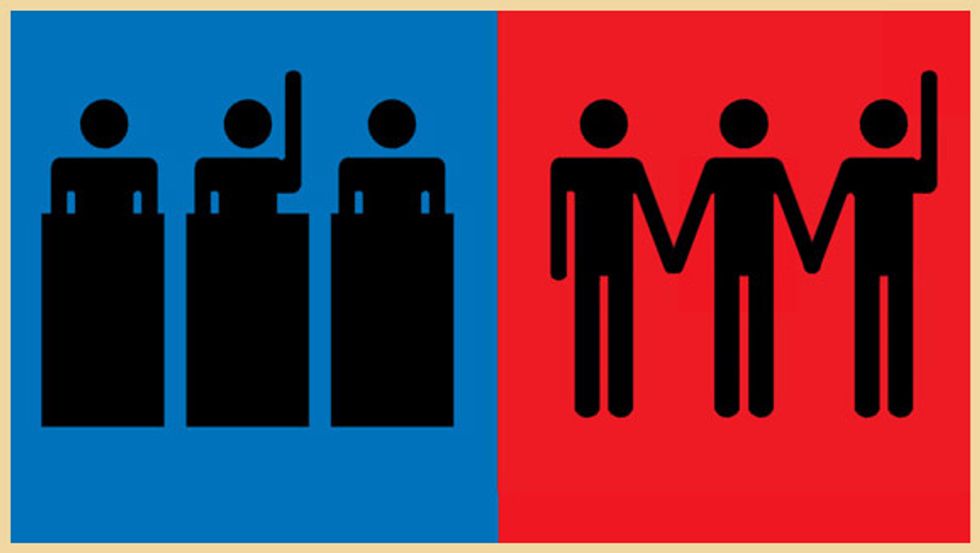Have you ever wondered how people are persuaded? Sometimes it's a little bit more complicated than simply making a compelling argument. Lots of different factors come into play that include not only psychological traits but also geological, biological, and IQ levels. Advertisements, political figures, and even society itself take all these factors into consideration and knowingly (and even sometimes unknowingly) use them in hopes to persuade their target audience.
1. Age
According to the life-stage hypothesis, there's a curvilinear relationship between persuasion and age. As you may have guessed, children fall victim to persuasion quite easily, especially to strangers (uh-oh).The American Academy of Pediatrics states, “young children — younger than 8 years — are cognitively and psychologically defenseless against [persuasion].”
On the other end of the spectrum, that same study found that elderly people are just as vulnerable, especially if they have any cognitive impairments like dementia or Alzheimer's. Even elderly folks who are mentally sound can fall victim easily to persuasion as well simply because they feel lonely or isolated: the opportunity to interact with someone (i.e. a salesperson) and have a brief conversation is so exciting that they're blissfully unaware what they're agreeing to do.
Overall, this study found that middle-aged individuals are far less vulnerable to persuasion.
2. Gender
"Gender stereotypes affect persuasion more than actual gender differences," says Robert Gass and John Seiter, authors of Persuasion: Social Influence and Compliance Gaining. These gender stereotypes showed that audiences thought that males were more competent than females. A study mentioned in their textbook explained that female doctors were expected to be more warm and nurturing, unlike male doctors who were expected to be more assertive and stern. Female doctors who were more assertive and had more masculine behavioral characteristics were not favored, and their patients were not persuaded by what they were telling them. The Reinforcement Expectancy Theory goes on to say that, ultimately, women are at a disadvantage because of the stereotypes that limit how influential they can be.
Recent studies have suggested that there is no reason to believe that one sex is more easily-persuaded than the other, but studies do show that there is a cross-sex effect. This means that people are more easily persuaded by the opposite sex than by those of the same gender.
3. Ethnicity and Culture
There are two main types of cultures: individualistic and collectivistic. Individualistic cultures value independence, personal gain, and personal success (i.e. the United States) while collectivist cultures focus on fitting in, benefiting the group rather than the individual person, and they strive for little-to-no conflict (China).
To persuade someone from an individualistic culture, the most promising strategies would be direct and assertive. Advertisements that promote individual benefits and monetary gain are said to work very well on this type of person. On the other hand, if you were trying to persuade someone from a collectivistic culture, indirect and cooperative strategies would be the way to go. Advertisements that promoted harmony and group-benefits would be most effective in persuasion.
Some popular country-specific strategies are:
United States:
Direct request or assertiveness
People's Republic of China:
Anshi: hinting, or being indirect or implicit
Yo she zuo ze: setting a personal example and hoping they will be persuaded to follow in suit
Tou qi suo: feeding people what they relish (doing a favor for someone before you ask them to do something for you)
Columbia:
Confiaza: trust or closeness (using your close bonds with people in attempt to persuade them to do something)
An interesting study found that Japanese people were the outliers in regards to these two types of cultures. They don't fall into just one or the other; they switch their cultural orientations based off of the situation at hand.
4. Intelligence
Research from a few decades ago initially suggested that moderately-intelligent people are the most easily persuadable because highly-intelligent people would quickly dismiss any attempt of persuasion, and people with low-intelligence would not be able to understand the message itself. Recent studies show that researcher's original theory may be incorrect and that individuals with low-intelligence are the easiest to influence.
5. Self-Esteem
Researchers have suggested that individuals with moderately high self-esteem can be more easily influenced than those with very high or very low self-esteem. Studies suggest that individuals who have low self-esteem are more likely to stop and listen to the persuader, but they are less likely to agree to what the persuader is saying. On the other hand, that same study showed that those with very high self-esteem were much less likely to stop and listen to the persuader, but if they did, they were more likely to go through with the persuader's instructions.
6. Being a High Self-Monitor vs a Low Self-Monitor
High self-monitors (HSMs) are individuals who are more adaptable and sensitive to social cues. Because of this, HSMs are easily influenced when it makes them look good or makes them fit in with their environment. Low self-monitors (LSMs) tend to not be phased by conformity, and they are more dependent. LSMs care more about - and are persuaded more by - the actual features and functions of a product or the results of a decision rather than what they hear about it through the grapevine.
7. How Ego-Involved You Are
If a person is severely ego-involved, they have a smaller latitude of acceptance with a much larger latitude for rejection. This makes severely ego-involved people extremely narrow-minded and very difficult to persuade. Those who are only mildly ego-involved have a latitude of acceptance that is much larger than their latitude for rejection. As you may have guessed, mildly ego-involved individuals are much easier to persuade because they are more willing to have an open mind. How ego-involved someone is changes by the subject. The Social Judgement Theory suggests that an individual could be very ego-involved regarding abortion but mildly ego-involved regarding immigration. If an individual has no opinion on an issue, they are said to fall into a latitude of noncommitment.
8. Whether You're a High "Dog" or Low "Dog"
According to Johnson J. (2009), high "dogs" like well-defined structure, status hierarchies, they tend to respect individuals of authority, and they see reality in black or white. They are not easily persuadable unless a person of power is the one trying to influence, and if that's the case, they will blindly follow. The best persuasion tactics to use on high "dogs" are strong arguments or fear tactics. Low "dogs" like less structure and more flexibility while placing less emphasis on authority. Low "dogs" tend to see reality in shades of gray, so they are more easily persuadable since their mindset allows them to think more freely.
So, based off of these factors, how persuadable do you think you are? Do you think you could use this list to improve your own persuasion tactics?
Information credit: All information was obtained through thePersuasion: Social Influence and Compliance Gainingtextbook (by Robert Gass and John Seiter) and the Persuasion Methods & Strategies PR course at Kennesaw State University taught by Professor Desirae Johnson.












 Energetic dance performance under the spotlight.
Energetic dance performance under the spotlight. Taylor Swift in a purple coat, captivating the crowd on stage.
Taylor Swift in a purple coat, captivating the crowd on stage. Taylor Swift shines on stage in a sparkling outfit and boots.
Taylor Swift shines on stage in a sparkling outfit and boots. Taylor Swift and Phoebe Bridgers sharing a joyful duet on stage.
Taylor Swift and Phoebe Bridgers sharing a joyful duet on stage.













